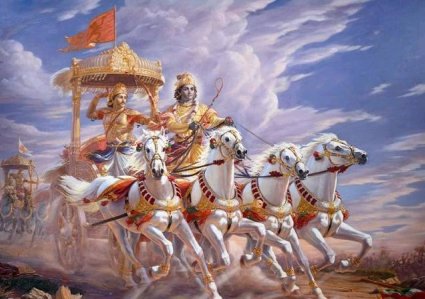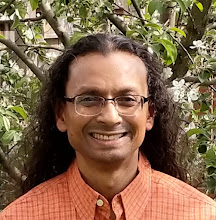
Om! Having bowed down to Narayana and Nara, the most exalted male being, and also to the goddess Saraswati, must the word Jaya be uttered.
The sage, Sauti, had been travelling for many days when he caught sight of his destination: the forest of Naimisha. Deep in the forest he found a group of sages sitting and conversing. He approached them with joined palms, and they invited him to sit with them.
The Rishi with the longest white beard then asked, "O Sauti, where hast thou spent the time? Please tell us in detail."
"I have just heard the Mahabharata composed by Krishna-Dwaipayana Vyasa, and recited in full by Vaisampayana at the Snake-sacrifice of the royal sage Janamejaya, the son of Parikshit. I then journeyed to Samantapanchaka, where the battle between the children of Kuru and Pandu was fought. Then, anxious to see you. I have come into your presence."
The normally serene Rishi betrayed some excitement as he said, "The purana, Mahabharata, is the most eminent narrative that exists, gleaned from the four Vedas. We are very eager to hear it."
Sauti continued, "Some are now already teaching this history, and others, in like manner, will hereafter promulgate it upon the earth."
As they spoke many more Munis and Rishis gathered around to listen. Once they had all settled in Sauti began his story.
"The son of Satyavati, the noble Dwaipayana Vyasa, had finished this greatest of narrations and began to consider how he might teach it to his disciples. Then in a sudden flash of light, Brahma appeared before him."
Surprised, Vyasa joined his palms and bowed before him, then asked, "O divine Brahma. I have composed a great poem, that explains the nature of existence and non-existence, birth celestial and human, asceticism, the art of war, and the nature of the all-pervading spirit. For such a work, no transcriber can be found on earth."
Brahma replied, "I know of your anxiety and have come accordingly. I know thou hast revealed the divine word in the language of truth. Let Ganesa be thought of, O Muni, for the purpose of writing down this poem." And with that Brahma vanished.
Vyasa sat in meditation and in no time at all Ganesa appeared before him. With bowed head and joined palms, Vyasa then asked, "O guide of the Ganas, be thou the transcriber of the Bharata which I have formed in my mind and will presently dictate?"
Ganesa replied, "I will become the transcriber of thy work provided thou art able to dictate continuously without pause or hesitation."
Vyasa thought for a moment, then said, "Agreed, but you must first fully comprehend what I dictate before you write it down."
"Om!", came Ganesa's terse acquiescence.
Sauti continued, "O Muni, no one is able to this day, to penetrate those closely knit difficult slokas. Even the omniscient Ganesa took a moment to consider, while Vyasa would avail himself of this interval to compose many more stanzas in his mind.
"In former days, the celestials placed the four Vedas on one side and the Bharata on the other and weighed them in the balance. And as the latter weighed heavier, being esteemed superior both in substance and gravity of import, it became known in the world from that day as - The Mahabharata!" (great Bharata)
Footnotes
1. Derived from: Adi Parva, Section I, p. 1-5, 15.


No comments:
Post a Comment